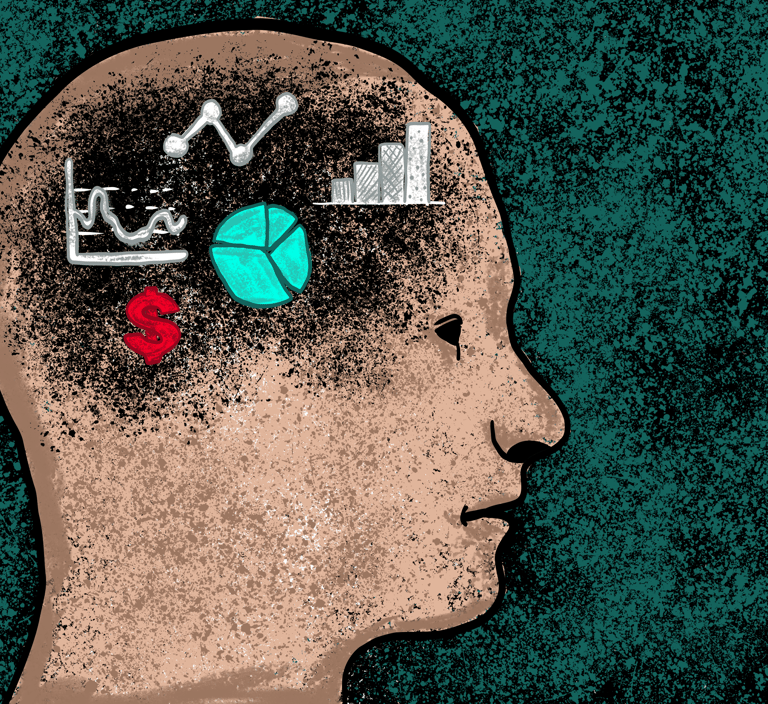Strategizing from 7 cities across the globe
Brain Economics: The Economic Value of a Flourishing Mind
Part IiI: The Impact of Psychiatric Variables on Productivity
Abstract
This part delves into the critical link between brain health, overall wellness, and economic productivity, emphasizing that a flourishing mind is not merely an individual concern but a fundamental driver of organizational success and broader economic resilience. Investment in employee health, particularly mental health, is shown to yield substantial economic returns, with enhanced employee health and well-being potentially generating up to $11.7 trillion in global economic value.
We explore here the tangible impacts of specific psychiatric variables on work output, moving beyond general wellness to detail how common mental health conditions directly impede productivity. The discussion centers on two primary mechanisms through which these variables manifest their economic toll: absenteeism and presenteeism. Absenteeism refers to employees missing work due to personal challenges, often health-related issues like mental health conditions, resulting in a direct loss of labor hours. Conversely, presenteeism occurs when employees are physically present at work but are underperforming due to mental health struggles, physical pain, or burnout. This form of productivity loss is often more challenging to detect but can have a more significant impact than absenteeism. Both conditions impose a significant economic burden. Mental health conditions such as depression and anxiety are estimated to cost employers in the United States between $44 and $51 billion annually in lost productivity. On a global scale, depression and anxiety disorders are estimated to cost the economy $1 trillion per year in lost productivity. A closer examination of depression reveals that presenteeism costs tend to be five to ten times higher than those associated with absenteeism. A substantial majority of the Lost Productive Time (LPT) costs employers face from employee depression are "invisible," primarily attributed to reduced performance while at work rather than outright absence, highlighting that the cost of presenteeism is often significantly underestimated. Specific estimated annual economic burdens in U.S. workplaces include $44 - $51 billion for depression and anxiety (lost productivity), ~$3,600 per hourly employee for absenteeism, ~$2,650 per salaried employee for absenteeism, $150 billion for general presenteeism, and $136.4 billion for fatigue at work (productivity & healthcare).
Several specific psychiatric variables are identified as major contributors to lost work output:
Chronic Stress: Defined as prolonged exposure to stressors, chronic stress is a leading psychiatric variable impacting work output. Biologically, it triggers an overactivation of the hypothalamic-pituitary-adrenal (HPA) axis, leading to excessive release of cortisol and other stress signaling molecules. This impairs cognitive functions critical for workplace efficiency, such as memory, decision-making, and concentration. The economic impact is substantial, leading to decreased employee performance and contributing to higher absenteeism. For example, in Sweden, burnout reduced the national labor income by 2.3% in 2019. The overall cost of work-related stress in the U.S. is estimated to range from $221 million to upward of $187 billion. Notably, research indicates that firms characterized by high burnout rates often pay lower wages, contradicting the "compensating wage differential" theory and suggesting a market inefficiency where the true costs of stress are not adequately factored into labor markets. The repercussions of burnout also extend beyond the individual, creating a multi-generational economic scar by impacting spousal income and children's educational achievements.
Depression: As one of the most well-established psychiatric variables affecting productivity, Major Depressive Disorder (MDD) is the main cause of disability for individuals aged 15 to 44 in the United States. Depression leads to significant cognitive impairments, including reduced concentration and compromised decision-making. Its impact on productivity is quantifiable, potentially leading to up to 27 lost workdays per employee annually. When extrapolated, depression is estimated to cost U.S. employers approximately $44 billion per year in Lost Productive Time (LPT), with a critical 81% of these costs attributed to presenteeism, reinforcing its "invisible" burden on productivity.
Anxiety Disorders: Characterized by excessive worry and fear that interfere with daily activities, particularly focus and decision-making, anxiety disorders involve the over-activation of brain regions like the amygdala, responsible for processing fear and emotional responses. However, the document notes a paradox: mild anxiety, when properly managed, can paradoxically act as a motivator, driving employees to meet deadlines and enhancing focus, as illustrated by the Yerkes-Dodson curve. Therefore, employers should focus on critical management: fostering environments and providing tools that allow employees to channel anxiety productively while preventing it from becoming debilitating.
ADHD (Attention-Deficit/Hyperactivity Disorder): This neurodevelopmental condition affects attention, impulse control, and executive functioning. Neurological differences, such as altered activity in the prefrontal cortex and dysfunctional interaction between the Default Mode Network (DMN) and Task Positive Network (TPN), lead to significant workplace challenges. The productivity loss associated with ADHD is substantial, with employees experiencing an average loss of 29 days of productivity per year compared to their colleagues. The estimated loss of workforce productivity associated with ADHD in the U.S. ranges between $67 billion and $116 billion. Despite these challenges, neurodivergent individuals often possess strengths such as creativity, non-linear thinking, and unique perspectives, which, when fostered, can provide immense value to employers.
Sleep Disorders: Common sleep disorders like insomnia and sleep apnea often stem from underlying issues such as chronic stress or mood disorders. They disrupt critical brain regions, particularly the prefrontal cortex, and alter the balance of key neurotransmitters essential for normal brain function, including emotional regulation and workplace productivity. The consequences for workplace productivity are direct and substantial: employees suffering from sleep deprivation exhibit slower task completion and are prone to making more mistakes. The economic impact of fatigue is massive, costing U.S. companies around $136.4 billion annually. These highlights sleep as a foundational element for mental health and productivity, as the consequences of poor sleep accumulate over time and contribute to chronic health conditions that further reduce productivity.
Addressing the impact of these psychiatric variables requires a multifaceted approach where employers play a significant role in fostering a supportive environment. The financial argument for investing in mental health is compelling: for every $1 spent on treatment for common mental health conditions, there is an estimated $4 return in improved health and productivity. Key strategies for employers include:
Offering comprehensive wellness programs that integrate and encourage utilization of mental health resources.
Implementing flexible work arrangements to empower employees and facilitate work-life integration.
Actively reducing stigma by encouraging open conversations, training managers to identify distress, and revising policies to treat mental health with the same importance as physical health.
Promoting Employee Assistance Programs (EAPs), recognizing a significant gap between provision and utilization and highlighting the need for cultural change.
Providing personalized interventions, such as Cognitive Behavioral Therapy (CBT) for stress, structured routines for ADHD, and accessible digital health tools.
Documented returns on investment for workplace mental health initiatives include a 6:1 ROI from reduced absenteeism and medical costs for workplace wellness programs, a $4 return for every $1 spent on mental illness treatment for common conditions, and a $1.50 to $4.00 return for every $1 invested in general mental health programs.
There are various significant and varied ways psychiatric variables impact work productivity through absenteeism and presenteeism, with substantial economic consequences costing billions annually in lost productivity. Addressing these issues is an undeniable economic imperative. Investing in employee mental well-being through comprehensive wellness programs, adaptable work arrangements, and proactive stigma reduction is essential for both individual flourishing and robust organizational success. A healthy mind is the bedrock of a productive workforce and a resilient economy, and the evidence unequivocally demonstrates that such investments yield significant returns, transforming mental health support from a cost center into a strategic driver of prosperity.
Furthermore, a truly forward-thinking approach must extend beyond the workplace. While companies are increasingly supporting employee mental health, evidence indicates that burnout and mental distress are often driven by systemic, non-professional stressors. Therefore, corporations must recognize their vested interest in the societal infrastructure that either fuels or mitigates these stressors. Investing in the community's well-being—through support for public health, stable housing, and other foundational pillars—is not merely philanthropy, but a direct, long-term investment in the resilience and productivity of their current and future workforce and consumer base. This broader macroeconomic framework will be explored in the final report of the series.


Download the full document
Design by Huda Khalili
Lead Researchers: Michael Martino, Elie Joe Akiki
Senior Researchers: Naji Mansour, Karim Harake, Tia Haidar, Jennifer Al Asmar
Junior Researchers: Caila Worley, Leticia Nassar, Michelle El Choueiry, Raya Hage
